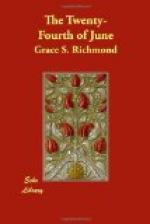At opposite ends of the long table sat Mr. and Mrs. Robert Gray. The head of the house looked his part: fine of face, crisp of speech, authoritative yet kindly of manner. His wife may be described best by saying that one had but to look upon her to know that here sat the Queen of the little realm, the one whose gentle rule covered them all as with the brooding wing of wise motherhood. Down the sides of the board sat the three sons: Stephen, tall and slender, grave-faced, quiet but observant; Louis, of a somewhat lesser height but broad of shoulder and deep of chest, his bright face alert, every motion suggesting vigour of body and mind; Ted—Edgar—the youngest, a slim, long-limbed lad with eyes eager as a collie’s for all that might concern him—this was the tale of the sons of the house. There were the two daughters: Roberta, she of the rose-coloured scarf—it was still about her shoulders, seeming to draw all the light in the room to its vivid hue, reflecting itself in her cheeks—Roberta, the elder daughter, dusky of hair, adorable of face, her round white throat that of a strong and healthy girl, her laugh a song to listen to; the other daughter, Ruth, a fair-haired, sober-eyed creature of growing sixteen, as different as if of other blood. One would not have said the two were sisters. There was one more girl at the table; no, not a girl, yet she looked younger than Roberta—a little person with a wild-rose, charming face, and the sweetest smile of them all—Rosamond, Stephen’s wife, quite incredibly mother of two children of nursery age, at this moment already properly asleep upstairs.
Last but far from least, loved and honoured of them all above the lot of average man to command such tribute, was the elder brother of the master of the house, his handsome white head and genial face drawing toward him all eyes whenever he might choose to speak—Judge Calvin Gray. All in all they were a goodly family, just such a family as is to be found beneath many a fortunate roof; yet a family with an individuality all its own and a richness of life such as is less common than it ought to be.
CHAPTER II
RICHARD CHANGES HIS PLANS
The next time Richard Kendrick went to the Gray home was a fortnight later, when old Matthew Kendrick was sending some material for which Judge Gray had written to ask him—books and pamphlets, and a set of maps. This time he would have sent a servant, but his grandson Richard heard him giving directions and came into the affair with a careless suggestion that he was driving that way and might as well take the stuff if Mr. Kendrick wished it. The old man glanced curiously at him across the table where the two sat at luncheon.
“Glad to have you, of course,” he commented, “but you made so many objections when I asked you before I thought I wouldn’t interfere with your time again. Did you meet any of the family when you went?”




